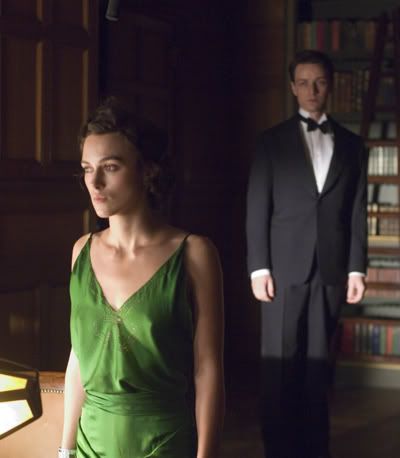
Somewhere behind the shadows of the darkness and in front of an audience of a book covered wall, a commoner and a debutante in a slip of an evening gown have been discovered in the most carnal of moments. The voyeur who has stumbled upon their passionate embrace is a small girl with a curious imagination and a deceptive edge to her own burgeoning sexuality. She doesn't understand what she sees but it ignites a fiery crusade in her to banish the man and ruin the lives of several other people, including her own. This is exactly when the pounding rhythm and momentum loses unfortunate steam in Joe Wright's "Atonement." The rest of the film falls apart with its incessant distraction from the devastation caused by a single night of confusion, revenge, and perception. War, war, and dead school girls become too much of a focus when at times you wonder if Wright will ever allow the two lovers to reconnect. What Wright does succeed at is perfuming scenes with a sense of aural and scenic pleasure. The maddening buzz of a bumble bee on a window sill or the cough of near orgasm makes the film worth watching, but sadly none of those gems are consistent throughout.
When the film opens the audience is treated to the violent thud of a typewriter typing at a furious speed. It's then incorporated into the film's score, which is an inspired and smart choice. The power of words is crucial in this doomed love triangle. The young girl, Briony (Saoirise Ronan) Tillis, has just finished a new play that she demands her cousins perform at their posh English country home. In case you haven't noticed, she's quite the tormented artist. The object of her affections is considerably older (Robbie) and in love with her sister. Her steely and all knowing eyes have a slight "Children of the Corn" air, but it also lends her to perceive her world as a would-be adult. She wants to direct her own play about the complex nature of love. What a 10-year-old child knows about love, especially a child living in a repressed world of English thoroughbreds, is almost entirely irrelevant. Ronan is an odd presence to watch. At times the adult-child dichotomy is thrilling to watch and other times Ronan comes across as a wooden brat. She of course is trumped, in more ways than one, by her gorgeous and pristinely patrician older sister Cecilia, played with convincing allure by Keria Knightley. It is she and Robbie (the magnificent James MacAvoy), who are discovered in that fateful library by Briony.
Although Knightley and MacAvoy are not on screen for longer than one would anticipate, when they are together they exude a natural chemistry that leaves you wondering why they haven't worked together before. There is a wonderful cross cutting montage when Robbie writes a letter apologizing for an incident earlier in the day involving Cecilia and a valuable vase. As he smokes, listens to records, and laughs at his own profane use of the word "cunt", the camera falls in love with Knightley's glamorous cheekbones and ability to wear impossibly chic evening gowns. It's breathtaking and this one of the few scenes that later on in the film when their characters are separated and then the shattering news is delivered at the film's climax about what we've been watching for the past hour or so, it makes you feel completely devastated by their brief but bubbling romance. Their desire is pure and at times raw, but that's the satisfying part of the film. We know what's going to happen but to watch them fall in love and try desperately to rekindle their affair is as compelling as the best screen romances can get. And we can't forget their tryst in the library. I won't ruin it but it's as hot as the summer time setting and as seductive as the two actors. The strings from the score are replaced with the breaths of sexual release and excitement between Robbie and Cecilia. It's so good she comes out of her gold slipper, literally and figuratively.
Mood works well when the lovers are finally brought back together after Robbie was sent to prison and eventually war for the mistake Briony makes in a case of misconstrued sexual deviancy. They meet in a busy tea room. Things are now tense and leadened with what happened in the past. Surrounding conversation engulfs the room making it more impossible for them to feel truly together. Their silent pauses and uncertainty is crushing to watch. Robbie escorts her to a waiting bus and they part ways, for now at least. He must get back to the war, where the film makes some inane choices.
The first of many mistakes is an overly long Steadycam shot. It only lasts five minutes or so, but it feels like it last an eternity, and somehow in Wright's hands that's not a compliment for such a spectacle. Robbie has returned to the beaches of Dunkirk to wait evacuation where he is met with limbless soldiers, dead horses, abandoned buildings, and surreal images of ferris wheels and a pommel horse practicing troop. It's the not the use of the shot that is so bothersome but the fact that it's unashamedly redundant and self-satisfying. As if we didn't know war was dirty and ugly as exemplified by an earlier shot of an orchid of dead school girls or by the first minute of the shot, Wright beats the audience over the head with a very self-conscious stylistic maneuver that should impress us but only left me feeling cheated and not impressed. And more importantly, what does this have to do with the meat and bones of the story, i.e. the love affair? Maybe Wright wanted us to know how horrible Robbie's life is after Briony's tiny white lie, but I think it's clear in other scenes when MacAvoy's newly minted movie star face is covered in dirt from the trenches and a knotted up anger and resentment for what the Tillis family did to him. I hope this wasn't intended to be as condescending as it reads, but Wright should never underestimate his audience.
Formal choices aside, the important casting choices also makes the middle section of the film a complete bore. I think I have liked Romola Garai in other films, but she is so stiff in this move you wonder if she even feels confident conveying the teenage Briony that is regretful of what she did as a child. Her version of emoting is hard and blank stares that are frustrating to watch. However, she is saved by the other actors in her scenes, whether it be a friendly nurse (Michelle Duncan), dying French soldier (Jérémie Renier), or Knightley. And of course it takes the brilliance of Vanessa Redgrave to show up all of the other Briony's. As the elder Briony there is a sense of the pain and guilt she has experienced etched on the wonderful wrinkles of Redgrave's face. Her eyes pierce and cut at you, communicating all of the hurt in a scene that only lasts five minutes.
In a time and a certain hermetic bubble the lovers meet and part, they can never fully realize their passion for one another. Wright lulls the audience in the first third with memorably erotic and moody details. However, "Atonement" also shows the limitations of a filmmaker, albeit one that is only on his second feature. Wright's lush and romantic eye can be visceral to watch but with more focus and less distraction, he could be a filmmaker to be turned on by. For now, we'll always have that night in the library.
Monday, January 7, 2008
two lovers
Subscribe to:
Post Comments (Atom)



No comments:
Post a Comment